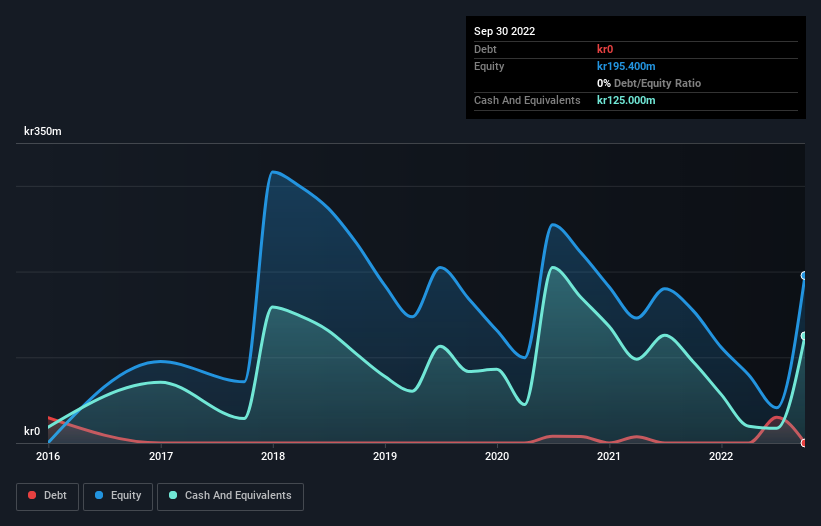- Sweden
- /
- Medical Equipment
- /
- OM:IRRAS
Is IRRAS (STO:IRRAS) In A Good Position To Deliver On Growth Plans?

Just because a business does not make any money, does not mean that the stock will go down. For example, although Amazon.com made losses for many years after listing, if you had bought and held the shares since 1999, you would have made a fortune. Nonetheless, only a fool would ignore the risk that a loss making company burns through its cash too quickly.
So, the natural question for IRRAS (STO:IRRAS) shareholders is whether they should be concerned by its rate of cash burn. In this article, we define cash burn as its annual (negative) free cash flow, which is the amount of money a company spends each year to fund its growth. Let's start with an examination of the business' cash, relative to its cash burn.
View our latest analysis for IRRAS
Does IRRAS Have A Long Cash Runway?
A company's cash runway is the amount of time it would take to burn through its cash reserves at its current cash burn rate. In September 2022, IRRAS had kr125m in cash, and was debt-free. Importantly, its cash burn was kr162m over the trailing twelve months. That means it had a cash runway of around 9 months as of September 2022. To be frank, this kind of short runway puts us on edge, as it indicates the company must reduce its cash burn significantly, or else raise cash imminently. Depicted below, you can see how its cash holdings have changed over time.

How Well Is IRRAS Growing?
Some investors might find it troubling that IRRAS is actually increasing its cash burn, which is up 23% in the last year. Given that its operating revenue increased 107% in that time, it seems the company has reason to think its expenditure is working well to drive growth. If revenue is maintained once spending on growth decreases, that could well pay off! It seems to be growing nicely. While the past is always worth studying, it is the future that matters most of all. So you might want to take a peek at how much the company is expected to grow in the next few years.
Can IRRAS Raise More Cash Easily?
Even though it seems like IRRAS is developing its business nicely, we still like to consider how easily it could raise more money to accelerate growth. Issuing new shares, or taking on debt, are the most common ways for a listed company to raise more money for its business. Commonly, a business will sell new shares in itself to raise cash and drive growth. By comparing a company's annual cash burn to its total market capitalisation, we can estimate roughly how many shares it would have to issue in order to run the company for another year (at the same burn rate).
Since it has a market capitalisation of kr378m, IRRAS' kr162m in cash burn equates to about 43% of its market value. From this perspective, it seems that the company spent a huge amount relative to its market value, and we'd be very wary of a painful capital raising.
So, Should We Worry About IRRAS' Cash Burn?
On this analysis of IRRAS' cash burn, we think its revenue growth was reassuring, while its cash burn relative to its market cap has us a bit worried. Summing up, we think the IRRAS' cash burn is a risk, based on the factors we mentioned in this article. On another note, we conducted an in-depth investigation of the company, and identified 5 warning signs for IRRAS (2 are a bit concerning!) that you should be aware of before investing here.
Of course, you might find a fantastic investment by looking elsewhere. So take a peek at this free list of interesting companies, and this list of stocks growth stocks (according to analyst forecasts)
New: AI Stock Screener & Alerts
Our new AI Stock Screener scans the market every day to uncover opportunities.
• Dividend Powerhouses (3%+ Yield)
• Undervalued Small Caps with Insider Buying
• High growth Tech and AI Companies
Or build your own from over 50 metrics.
Have feedback on this article? Concerned about the content? Get in touch with us directly. Alternatively, email editorial-team (at) simplywallst.com.
This article by Simply Wall St is general in nature. We provide commentary based on historical data and analyst forecasts only using an unbiased methodology and our articles are not intended to be financial advice. It does not constitute a recommendation to buy or sell any stock, and does not take account of your objectives, or your financial situation. We aim to bring you long-term focused analysis driven by fundamental data. Note that our analysis may not factor in the latest price-sensitive company announcements or qualitative material. Simply Wall St has no position in any stocks mentioned.
About OM:IRRAS
IRRAS
IRRAS AB (publ), a medical device company, focuses on the delivery of medical solutions to enhance the lives of critically ill patients worldwide.
Adequate balance sheet and slightly overvalued.


